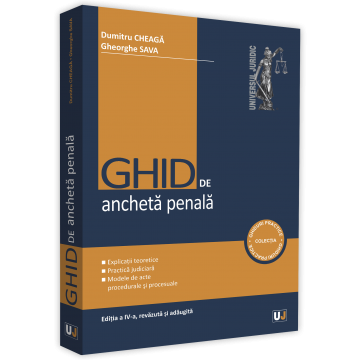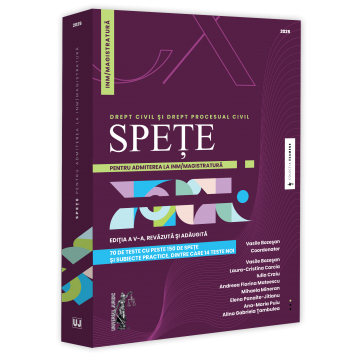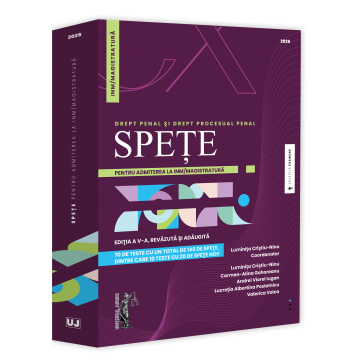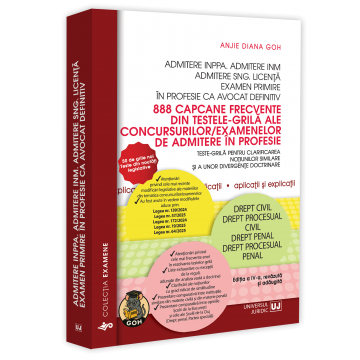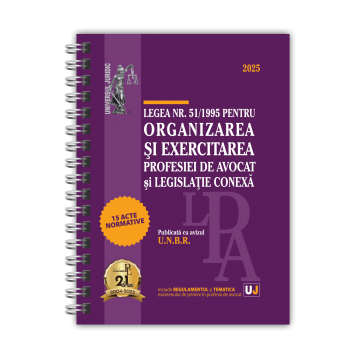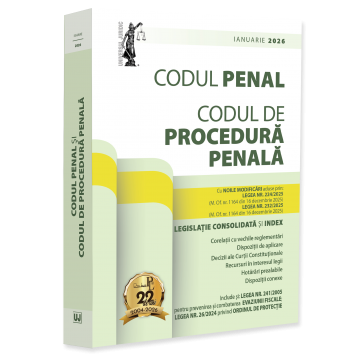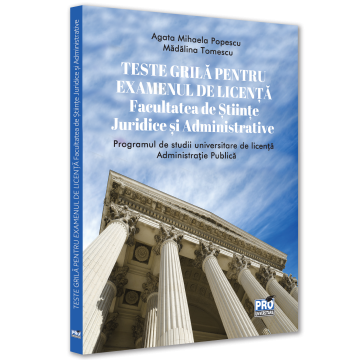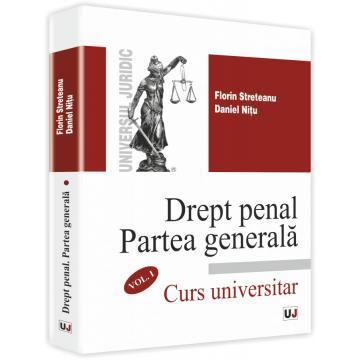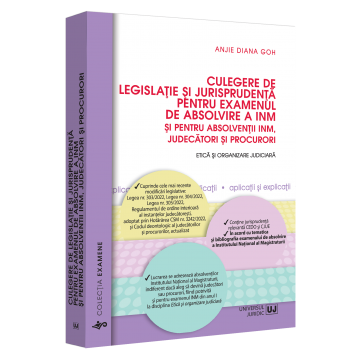ISBN: 978-606-591-915-0
DOI: 10.5682/9786065919150
Publisher year: 2014
Edition: I
Pages: 686
Publisher: Editura Universitară
Author: --
- Description
- Download (1)
- Authors
- Content
- More details
- Reviews (0)
-
Curtea Constitutionala a Romaniei si dreptul Uniunii Europene. Culegere de jurisprudenta
Download
Foreword / 5
Chapter I
The relations between the national legal order and that of the European Union. The role and competences of the Constitutional Court / 31
Through the acts of transfer of some attributions to the structures of the European Union, they do not acquire, by endowment, an “overcompetence”, an own sovereignty. In reality, the member states of the European Union have decided to jointly exercise certain attributions that, traditionally, belong to the field of national sovereignty. Romania's integration into the European Union implies compliance with the provisions of the acquis communautaire regarding the free movement of capital, the rights of European citizens to invest and acquire goods on an equal footing with Romanian citizens. (Decision no. 148 of April 16, 2003 on the constitutionality of the legislative proposal for the revision of the Romanian Constitution, published in the Official Gazette no. 317 of 12.05.2003) / 31
The revision proposal only formally enshrines the status of a member state of the European Union, updating the constitutional provisions adopted during the pre-accession period. The new text resumes the constitutional solution regarding the ratification, this time of the acts of revision of the constitutive treaties of the European Union and of the treaties regarding the accession of some states to the European Union, by laws adopted by the Parliament, with a two-thirds majority. Also, the revision law resumes the solution that enshrines the priority of application of the provisions of the constitutive treaties, as well as of the other legal acts with obligatory character compared to the contrary provisions of the internal laws. Moreover, following accession to the European Union, the Member States must comply with a fundamental principle of the Community legal order, namely the direct effect of the rules adopted by the institutions of the Union. In addition, the content of the new article no longer contains the obligation of the Government to send to the Parliament the draft acts of a binding nature before they are submitted to the approval of the European Union institutions. (Decision no. 799 of June 17, 2011 on the draft law on the revision of the Romanian Constitution, published in the Official Gazette no. 440 of 23.06.2011) / 60
In accordance with the provisions of Article 148 paragraph (4) of the Constitution, the Romanian state authorities have undertaken to guarantee the fulfillment of the obligations resulting from the constitutive treaties of the European Union, from the binding community regulations and from the act of accession. In this sense, the Government is constitutionally empowered to guarantee, through the means at its disposal, the fulfillment of Romania's obligations towards the European Union. Thus, the use of emergency ordinances to reconcile the national legislation with the community one in the situation in which the initiation of the infringement procedure before the Court of Justice was imminent is fully constitutional. In these conditions, it is found that the criticized emergency ordinance complies with the requirements of art.115 paragraph (4) of the Constitution. (Decision no. 802 of 19 May 2009 regarding the exception of unconstitutionality of the provisions of the Government Emergency Ordinance no. 50/2008 for the establishment of the pollution tax for motor vehicles, as a whole, and, in particular, of those of art. 11 of the same emergency ordinance, published in the Official Gazette No. 428 of 23.06.2009) / 106
With regard to the alleged infringement of the right to property by establishing a protection superior to the property of the European Union, the Court found that the criticized regulation does not seek the protection of the right of private property, but the protection of funds related to the patrimony of a supranational institution. the perspective acquires, in accordance with the provisions of art. 148 of the Constitution, the connotations of a distinct public property. (Decision no. 869 of June 23, 2011 regarding the exception of unconstitutionality of the provisions of art. 181 of Law no. 78/2000 for the prevention, discovery and sanctioning of corruption, published in the Official Gazette no. 639 of 07.09.2011) / 110
The possibility of extending the meaning of a text of law subject to constitutional review is open to the Constitutional Court by virtue of the constitutional provisions that enshrine its role as guarantor of the supremacy of the Constitution, which it has the obligation to fulfill effectively. (Decision no. 417 of October 15, 2013 regarding the exception of unconstitutionality of the provisions of art. 21 para. (2) first sentence of the Law on administrative contentious no. 554/2004 and of art. 64 para. / 2000 regarding the norms of legislative technique for the elaboration of normative acts, published in the Official Gazette no. 743 of 02.12.2013) / 114
Equally, each Member State, by virtue of the principle of national constitutional identity, has full freedom to regarding the establishment of the normative framework relative to the status of the parliamentarians who act in the national legislative forum, including the legal regime of the patrimonial rights afferent to the exercise of these functions of public dignity. (Decision no. 964 of November 20, 2012 regarding the exception of unconstitutionality of the provisions of art. 1 letter f) of Law no. 119/2010 on establishing measures in the field of pensions, published in the Official Gazette no. 23 of 11.01.2013) / 120
With regard to the invocation of Case C-310/10, resolved by the Judgment of 7 July 2011, delivered by the Court of Justice of the European Union, the Court notes that the authors of the exception erroneously draw certain conclusions which do not result from the considerations of this judgment. Paragraphs 46 and 47 of the judgment address issues related to the distribution of powers between the Union and the Member State, without calling into question the effects of a decision of the Romanian constitutional court. The Court of Justice of the European Union has ruled that, “although the need to ensure a uniform interpretation of the rules of Union law may, as mentioned above, justify the extension of the Court's jurisdiction over the content of such rules, including in the case of which are applicable only indirectly to a given situation, given that a rule of national law refers to them, it is not possible, on the basis of the same consideration and without infringing the division of powers between the Union and its Member States, to supremacy is given to the respective norm of the Union law in relation to the internal norms of superior rank, which would impose, in such a situation, the removal of the application of the respective norm of national law or of the interpretation given to it ”. It follows that the field of remuneration of staff paid from public funds falls within the competence of the Member State, and not of the Union, which means that it does not fall within the scope of European Union regulations. (Decision no. 199 of March 6, 2012 regarding the exception of unconstitutionality of the provisions of art. 1 of Law no. 285/2010 on the remuneration in 2011 of the staff paid from public funds, published in
Official Gazette no. 317 of 11.05.2012) / 124
In the relations between the community legislation and the national one (except for the Constitution), one can speak only of the priority of application of the first one over the other one, a matter that falls within the competence of the courts. (Decision no. 137 of February 25, 2010 regarding the exception of unconstitutionality of the provisions of art. 4 letter a) of the Government Emergency Ordinance no. 50/2008 for the establishment of the pollution tax for motor vehicles, published in the Official Gazette no. 182 din 22.03.2010) / 132
The author of the exception considers that the court of constitutional control is called to carry out a control of the concordance of the internal law with the European law, in order to standardize the judicial practice in the matter. In this connection, the Court notes that the courts are the ones called upon to address the Court of Justice of the European Communities, in order to ensure the effective and homogeneous application of Community law. (Decision no. 558 of June 7, 2007 regarding the exception of unconstitutionality of the provisions of art. 38 and art. 52 of Law no. 248/2005 regarding the regime of free movement of Romanian citizens abroad, published in the Monitorul
Official no.464 of 10.07.2007) / 135
In the situation where the Constitutional Court would consider itself competent to rule on the conformity of the national legislation with the European one, a possible conflict of jurisdictions between the two courts would be reached, which, at this level, is inadmissible. (Decision no. 1596 of November 26, 2009 regarding the exception of unconstitutionality of the provisions of art. 4 letter a) and art. 11 of the Government Emergency Ordinance no. 50/2008 for the establishment of the pollution tax for motor vehicles, as well as of the ordinance emergency as a whole, published in the Official Gazette no. 37 of 18.01.2010) / 139
It is not within the competence of the Constitutional Court to analyze the conformity of a provision of national law with the text of the Treaty of Lisbon in the light of art. 148 of the Fundamental Law. Such jurisdiction, namely to determine whether there is a conflict between national law and the Treaty of Lisbon, which entered into force on 1 December 2009, belongs to the court. (Decision no. 1197 of September 30, 2010 regarding the exception of unconstitutionality of the provisions of art. 147 paragraph 2 and of art. 255 paragraph 1 of the Criminal Code, published in the Official Gazette no. 732 of 03.11.2010) / 143
If the point of view were accepted in the sense that the constitutional court can rule on the constitutionality of a text of law by reference to the provisions of a Community act, it would obviously violate the powers of the Court of Justice of the European Union, since the interpretation of the basic treaties is within the competence of the latter (art. 267 of the Treaty). (Decision no. 1249 of October 7, 2010 regarding the exception of unconstitutionality of the provisions of art. 4 letter a) of the Government Emergency Ordinance no. 50/2008 for the establishment of the pollution tax for motor vehicles, published in the Official Gazette no. 744 of 16.11.2010) / 146
Regarding the invocation of the provisions of “Regulation no. 96/2004 in the matter of community civil servants”, by Decision no. 676 of 18 May 2010, published in the Official Gazette of Romania, Part I, no. 416 of 22 June 2010, the Court observes that establishing the compatibility of the provisions of the national legislation with those contained in documents issued by the institutions of the European Union cannot be made by the court of constitutional contentious, but falls, within the operation of interpretation and application of the law, to the judge invested with resolving the dispute. raised the exception of unconstitutionality (Decision no. 1574 of December 7, 2010 regarding the exception of unconstitutionality of the provisions of art. 94 paragraph (1) letter m) reported to art. 54 letter h) of Law no. 188/1999 on the Statute civil servants, published in the Official Gazette no. 110 of 11.02.2011) / 150
The Court of Justice of the European Union has no jurisdiction to rule on the validity or invalidity of national law. The consequence of a given interpretation of the Treaty may be that a provision of national law is incompatible with European law. (Decision no. 903 of June 30, 2011 regarding the exception of unconstitutionality of the provisions of art. 4 letter a) of the Government Emergency Ordinance no. 50/2008 for the establishment of the pollution tax for
vehicles, published in the Official Gazette no.673 of 21.09.2011) / 156
The criticism of unconstitutionality reported to art.148 par. (2) of the Constitution. Even if the author of the exception of unconstitutionality does not indicate the infringed provision of European legislation on the free movement of goods, it can reasonably be determined that it refers to the provisions of Title II of the Treaty on the Functioning of the European Union. However, the Court holds that it is not competent to analyze the conformity of a provision of national law with the text of the Treaty on the Functioning of the European Union in the light of Article 148 of the Constitution. (Decision no. 498 of May 10, 2012 regarding the exception of unconstitutionality of the provisions of art. 1 letter g) of Law no. 12/1990 on the protection of the population against illicit commercial activities, published in the Official Gazette no. 428 of 28.06.2012 ) / 160
Although the Court of Justice of the European Union has ruled on the provisions of Council Directive 2006/112 / EC of 28 November 2006 on the common system of value added tax, which clearly, precisely and unequivocally established its meaning, the rule has constitutional relevance, so that its normative content supports the possible violation by the national law of the Constitution. Thus, it remains for the court to take all necessary steps to find out the real situation regarding the existence or non-existence of VAT Committee consultations and, studying European jurisprudence, either to apply it directly or, if deemed necessary, to ask a preliminary question. (Decision no. 354 of September 24, 2013 regarding the exception of unconstitutionality of the provisions of the Government Emergency Ordinance no. 34/2009 regarding the budgetary rectification for 2009 and the regulation of some financial-fiscal measures, as well as of art. 1451 of the Law no. 571/2003 regarding the Fiscal Code in the form introduced by the Government Emergency Ordinance no. 34/2009, published in the Official Gazette no. 744 of 09.12.2013) / 167
Chapter II
Constitutional Court and the procedure of the preliminary reference to the Court of Justice of the European Union / 175
It remains at the discretion of the Constitutional Court the application within the constitutionality control of the decisions of the Court of Justice of the European Union and the formulation by itself of preliminary questions in order to establish the content of the European norm. Such an attitude is related to the cooperation between the national and the European constitutional court, as well as to the judicial dialogue between them, without bringing into discussion aspects related to the establishment of hierarchies between these courts. In this case, although the meaning of the European norm was clarified by the Court of Justice of the European Union, the requirements resulting from this decision have no constitutional relevance, they are rather related to the obligation of the Legislature to enact norms within the meaning of the decisions of the Court of Justice. otherwise finding eventually the application of art.148 paragraph (2) of the Romanian Constitution. (Decision no . 1088 of July 14, 2011 regarding the exception of unconstitutionality of the provisions of art. 1 and 3 of the Government Emergency Ordinance no. 50/2008 for the establishment of the pollution tax for motor vehicles, published in the Official Gazette no. 668 of 20.09.2011) / 181
Application requesting the suspension of the trial of the exception of unconstitutionality and the notification of the Court of Justice of the European Communities with a preliminary reference. Rejection without motivation. (Decision no. 392 of March 25, 2008 regarding the exception of unconstitutionality of the provisions of art. 56 letter c), art. 58 and art. 227 paragraph (1) letter c) of Law no. 31/1990 on commercial companies , as well as art.82 paragraphs (1) and (2) of Law no.51 / 1995 for the organization and exercise of the profession of lawyer, published
in the Official Gazette no. 309 of 21.04.2008) / 181
Application requesting the suspension of the trial of the exception of unconstitutionality and the notification of the Court of Justice of the European Communities with a preliminary reference. Rejection without motivation. (Decision no. 394 of March 25, 2008 regarding the exception of unconstitutionality of the provisions of art. 56 letter c), art. 57 and art. 58 of Law no. 31/1990 on commercial companies, art. 2 paragraph (3) , art.3 paragraph (1) letters d), e) and h) and art.48 of Law no.51 / 1995 for the organization and exercise of the legal profession, as well as art.329 paragraph 3 of the Code of Procedure civil, published in the Official Gazette no. 309 of 21.04.2008) / 185
Chapter III
The use of a norm of law of the European Union within the constitutionality control / 190
Since the Constitutional Court is neither a positive legislator nor a court with jurisdiction to interpret and apply European law in disputes arising from the subjective rights of citizens and without reconsidering the aforementioned jurisprudence, the use of a rule of European law in constitutional review that the norm interposed to the reference one implies, based on art. 148 paragraphs (2) and (4) of the Romanian Constitution, a cumulative conditionality: on the one hand, this norm should be sufficiently clear, precise and unequivocal by itself or its meaning has been clearly, precisely and unequivocally established by the Court of Justice of the European Union and, on the other hand, the norm must be limited to a certain level of constitutional relevance, so that its normative content supports the possible violation by the national law of the Constitution - the only direct reference norm within the constitutionality control. In such a hypothesis, the approach of the Constitutional Court is distinct from the simple application and interpretation of the law, the competence belonging to the courts and administrative authorities, or to the possible issues related to the legislative policy promoted by the Parliament or the Government, as the case may be. In view of the cumulative conditionality stated, it remains at the discretion of the Constitutional Court to apply within the constitutionality control the decisions of the Court of Justice of the European Union or to formulate by itself preliminary questions in order to establish the content of the European norm. Such an attitude is related to the cooperation between the national and the European constitutional court, as well as to the judicial dialogue between them, without bringing into discussion aspects related to the establishment of hierarchies between these courts. In this case, although the meaning of the European norm was clarified by the Court of Justice of the European Union, the requirements resulting from this decision have no constitutional relevance, they are rather related to the legislative obligation to enact rules within the meaning of the decisions of the Court of Justice otherwise finding eventually the application of art.148 paragraph (2) of the Romanian Constitution. (Decision no. 668 of 18 May 2011 regarding the exception of unconstitutionality of the provisions of art. 4 letter a) of the Government Emergency Ordinance no. 50/2008 for the establishment of the pollution tax for motor vehicles, of annexes no. 1-4 to this emergency ordinance, as well as of the Government Emergency Ordinance no. 50/2008, as a whole, published in the Official Gazette no. 487 of 08.07.2011) / 190
The Constitutional Court took note of the direct application of the provisions of art. .148 paragraph (2) of the Constitution, regarding the priority application of community regulations. It should be noted that the obligation to notify state aid rests with the Competition Council, as the contact authority between Romania and the European Commission, according to the provisions of Government Emergency Ordinance no. 117/2006, Commission that will decide on the granting of state aid considered by the law subject to constitutional review. On the other hand, dand exceeds the constitutionality check, the Court finds that the provisions of the criticized law must be agreed, first of all, with the provisions of the Government Emergency Ordinance no. 117/2006 on national procedures in the field of state aid, which repealed the relevant domestic legislation, and, secondly, they must be correlated with the provisions of Articles 87-89 of the Treaty establishing the European Community. (Decision no. 59 of January 17, 2007 on the notification of unconstitutionality regarding the provisions of art. 1 and art. 3 of the Law on the approval of financial measures for small and medium enterprises in the industry
beer, published in the Official Gazette no. 98 of 08.02.2007) / 198
The criticized texts do not contradict the Regulation no. 581/2008 of the European Parliament and of the Council of the European Union, invoked by the authors of the exception. On the contrary, I give it substance, concretizing, in the spirit of the will of the community legislator, the more general provisions contained in this regulation. Therefore, nothing prevents the state from sanctioning the company for the misconduct of its employee, which retains its right of recourse against the one who, directly and directly, is responsible. (Decision no. 547 of 15 May 2008 regarding the exception of unconstitutionality of the provisions of art. 9 paragraph (1) of the Government Ordinance no. 37/2007 on establishing the framework for the application of the rules on driving periods, breaks and rest periods of drivers and the use of devices for recording their activity, published in the Official Gazette no. 430 of 09.06.2008) / 207
Regulation of the Council of the European Union no. 343/2003, published in the Official Journal of the European Communities L 199, 31/07/2007, p.0023-0029, establishing the criteria and mechanisms for determining the Member States responsible for examining applications submitted in one of the Member States. members of a national of a third country, provides, in art.19 par.2, that the implementation of the transfer is not suspended in case of introduction of an appeal, in this case, the complaint. But this is not an imperative rule, but allows either domestic legislation or national courts to assess, on a case-by-case basis, the need to suspend the execution of the transfer order in another state. (Decision no. 604 of May 20, 2008 regarding the exception of unconstitutionality of the provisions of art. 121 of Law no. 122/2006 on asylum in Romania, published in the Official Gazette no. 469 of 25.06.2008) / 211
In the present case, in view of the provisions of Article 11 paragraph (1) of the Basic Law, the jurisprudence of the Court of Justice of the European Community, respectively cases 61/65, G. Vaassen-Göbbels v. Management of the Beambtenfonds voor het Mijnbedrijf and C-17/00 François De Coster v. College of Mayors and Aldermen of Watermael-Boitsfort. The Court finds that these cases are examples in which the Court of Justice of the European Community has interpreted, in the context of Article 234 of the Treaty establishing the European Community, the notion of "court" competent to address it with a preliminary appeal, establishing in this regard some specific requirements for delimiting this concept from other notions used that define different bodies in the national law of the Member States. However, these criteria (body established by law, membership of one of the state powers, permanent character, binding jurisdiction, adversarial procedure, application of the law, independence) are limited to the scope of the law applied by the Luxembourg Court, namely Community law, and not domestic law. Thus, when examining the exception of unconstitutionality, the Constitutional Court cannot take into account the criteria for determining a court that the Court of Justice of the European Community uses in its activity. (Decision no. 1166 of September 17, 2009 regarding the exception of unconstitutionality of the provisions of art. 37 par. (1) and (2) of Law no. 31/1990 on commercial companies, published in the Official Gazette no. 706 of 21.10.2009 ) / 216
The fact that the relevant Community legislation is, unlike domestic law, more permissive or milder, does not ipso facto attract the unconstitutionality of the national legal provision. (Decision no. 311 of March 23, 2010 regarding the exception of unconstitutionality of the provisions of art. 50 letter a) of the Competition Law no. 21/1996, published in the Official Gazette no. 294 of 05.05.2010) / 220
Considering the place that the community regulations occupy, according to art. 148 para. (2) of the Constitution, in relation to domestic law, the Court is called upon to invoke in its jurisprudence the binding acts of the European Union whenever they will be relevant to the case, as long as their content is not equivocal and does not require its own interpretation. . (Decision no. 383 of March 23, 2011 regarding the notification of unconstitutionality the provisions of art. I point 2 regarding art. 16 para. (1), point 9 regarding art. 31 para. (1), point 25, point 37 regarding art. 72 para. (5), point 40 regarding art. 79 para. (4), point 51 regarding art. 94 para. (2), points 52, 66, 70, 75, 78, 84 and art. II para. (1) of the Law amending and supplementing Law no. 53/2003 - Labor Code, as well as the law as a whole, published in the Official Gazette no. 281 of April 21, 2011) / 222
Since the Constitutional Court is neither a positive legislator nor a court with jurisdiction to interpret and apply European law in disputes involving the subjective rights of citizens and without reconsidering the aforementioned jurisprudence, the Court notes that the use of a rule of law within the constitutionality control, as the norm interposed to the reference one, implies, based on art.148 paragraphs (2) and (4) of the Romanian Constitution, a cumulative conditionality: on the one hand, this norm should be sufficiently clear , precise and unequivocal by itself or its meaning has been clearly, precisely and unequivocally established by the Court of Justice of the European Union and, on the other hand, the norm must be limited to a certain level of constitutional relevance, so that the content or normative to support the possible violation by the national law of the Constitution - the only direct reference norm within the control and constitutionality. In such a case, the approach of the Constitutional Court is distinct from the simple application and interpretation of the law, the competence belonging to the courts and administrative authorities, or to the possible issues related to the legislative policy promoted by the Parliament or the Government, as the case may be. (Decision no. 921 of July 7, 2011 regarding the exception of unconstitutionality of the provisions of art. 4 letters a) and letters b) of the Government Emergency Ordinance no. 50/2008 for the establishment of the pollution tax for motor vehicles, published in the Monitorul
Official no.673 of 21.09.2011) / 242
The provisions of art. 373 ind.1 of the Code of Civil Procedure and those of Regulation (EC) no. 805/2004 refers to different categories of legal acts, on the one hand, court decisions pronounced by the Romanian courts, for which it is necessary to approve the execution, and, on the other hand, court decisions that have been certified as European executory title in home Member State, recognized and enforced in the other Member States, without the need for approval. Therefore, as regards the alleged discrimination between creditors holding a European Enforcement Order and those holding a judgment of the Romanian courts, the Court finds that this cannot be retained, as, as has been stated in many cases, the principle of equality it does not have the meaning of uniformity, this implying the establishment of an equal treatment for situations that, depending on the purpose pursued, are not different. Or, the essential difference between the two categories of creditors is given by an element of foreignness, represented by the state in which the court decision is pronounced. It turns out that the factual situations that are regulated are different, so the legal treatment applied to them must be different. (Decision no. 1289 of October 4, 2011 regarding the exception of unconstitutionality of the provisions of art. 373 ind. 1 of the Code of Civil Procedure, published in the Official Gazette no. 830 of November 23, 2011) / 248
The provisions of art.8 paragraph (3) point 4 of the Government Ordinance no.37 / 2007 include the description of one of the facts considered a minor violation of some European normative acts in the field of road transport, and art.9 paragraph (1) letter e ) of the same ordinance establishes the corresponding sanction. The Court notes that they were enacted in the spirit of paragraph 26 of the preamble to Regulation (EC) No 561/2006 of the European Parliament and of the Council of 15 March 2006 on the harmonization of certain provisions of social legislation relating to road transport of Council Regulations (EEC) no.3.821 / 85 and (CE) no.2.135 / 98 and repealing Council Regulation (EEC) no.3.820 / 85, published in the Official Journal of the European Union series L no.102 of April 11, 2006. According to him, Member States should lay down rules on penalties applicable to infringements of the said Regulation and ensure that they are applied, the sanctions being effective, proportionate, dissuasive and non-discriminatory. Point 17 of the preamble of Regulation (EC) no. 561/2006 mentions, as a justification for the regulation, the improvement of the social conditions for the workers to whom it is applied and the increase of the road safety. (Decision no. 102 of February 9, 2012 regarding the exception of unconstitutionality of the provisions of art. 8 ali n. (3) point 4 and art. 9 paragraph (1) letter e) of the Government Ordinance no. 37/2007 on establishing the framework for the application of the rules on driving periods, breaks and rest periods for drivers and the use of devices for recording their activity, published in the Official Gazette no. 291 of 03.05.2012) / 252
The author of the exception invokes the provisions of art. 11 paragraphs (1) and (2) of the Constitution, with reference to Regulation (EC) no. 561/2006 of the European Parliament and of the Council. Or, art.11, entitled “International law and domestic law”, refers to treaties, within the meaning of Law no. 590/2003 on treaties, published in the Official Gazette of Romania, Part I, no. 23 of January 12, 2004. legal instrument of international law, although in the context of the indicated constitutional norm it acquires valence lato sensu, cannot be confused with the regulation adopted at the level of the European Union, a legal act that falls within the secondary legislation of European law. (Decision no. 114 of February 9, 2012 regarding the exception of unconstitutionality of the provisions of art. 9 par. (1) letter c) of the Government Ordinance no. 37/2007 regarding the establishment of the framework for the application of the rules regarding driving periods, breaks and the rest periods of the drivers and the use of the devices for recording their activity, published in the Official Gazette no. 244 of 11.04.2012) / 256
In order to ensure the application in Romania, from the date of Romania's accession to the European Union, of the provisions of Regulation (EC) no. 2006/2004 of the European Parliament and of the Council of 27 October 2004, the Government Decision no. 244/2007 on the authorities was adopted. competences responsible for the application of legislation in the field of consumer protection and cooperation between national authorities in this field, published in the Official Gazette of Romania, Part I, no. 187 of March 19, 2007, amended by Government Decision no. 784/2008, published in the Official Gazette of Romania, Part J, no. 561 of July 24, 2008, which, by art. 2, designates the National Authority for Consumer Protection as the sole liaison office responsible for the application of Regulation (EC) no. 2006/2004, as well as the competent authorities to ensures the application of the legislation in the field of consumer protection in accordance with it, provided in the annex which is an integral part of the decision. (Decision no. 252 of March 15, 2012 regarding the exception of unconstitutionality of the provisions of art. 10 letter b) of the Government Ordinance no. 21/1992 on consumer protection, published in the Official Gazette no. 333 of 17.05.2012) / 261
Regulation (EC) No 805/2004 of the European Parliament and of the Council of 21 April 2004 on the creation of a European Enforcement Order for uncontested claims, published in the Official Journal of the European Union, L series, No 143 of 30 April 2004, the author of the exception of unconstitutionality, considered the creation of a European enforceable title for uncontested claims, he applying in case of issuance of an enforceable title by a court from a member country, the execution will take place in another member country . The author of the exception of unconstitutionality is not in the hypothesis provided by the regulation of the European Union, so that the Court cannot proceed further to the analysis of the provisions of the Code of Civil Procedure in the light of the provisions of the regulation of the European Union. (Decision no. 468 of May 8, 2012 regarding the exception of unconstitutionality of the provisions of art. 274 par. 1, 2 and 3 of the Code of Civil Procedure, published in the Official Gazette no. 524 of 27.07.2012). / 267
The texts of Law no. 85/2006, which constitute the general legal framework in the matter of insolvency, establish certain measures for the protection of insolvent debtors, respectively the legal suspension of any judicial, extrajudicial or enforcement measures for the realization of claims on its debtor. its assets starting with the date of opening the procedure, as well as maintaining the ongoing contracts at the date of opening the procedure. According to Council Regulation (EC) No 1,346 / 2000 of 29 May 2000 on insolvency proceedings, published in the Official Journal of the European Union series L no. 160 of 30 June 2000, as subsequently amended, the legislation on conditions is left to the discretion of the States. for opening, conducting and closing the insolvency proceedings, including establishing the effects of the insolvency proceedings on the ongoing contracts to which the debtor is a party. (Decision no. 342 of September 24, 2013 regarding the exception of unconstitutionality of the provisions of art. 36 of the Government Emergency Ordinance no. 66/2011 on the prevention, ascertainment and sanctioning of irregularities in obtaining and using European funds and / or public funds related to them, publias in the Official Gazette no. 669 of 31.10.2013) / 270
Chapter IV
Application of the Charter of Fundamental Rights of the European Union / 279
The provisions invoked by the Charter of Fundamental Rights of the European Union, a distinct act as the legal nature of the other international treaties invoked, are, in principle, applicable in constitutional review insofar as they ensure, guarantee and develop the constitutional provisions on fundamental rights, in other words, to the extent that their level of protection is at least at the level of constitutional norms in the field of human rights. (Decision no. 871 of June 25, 2010 regarding the objection of unconstitutionality of the provisions of the Law on establishing measures in the field of pensions, published in the Official Gazette no. 433 of 28.06.2010) / 279
The provisions of the Charter of Fundamental Rights of the European Union are applicable in constitutional review insofar as they ensure, guarantee and develop the constitutional provisions on fundamental rights, in other words, insofar as their level of protection is at least at the level of constitutional norms in the field. human rights. Considering that the provisions of art. 1 thereof refer to human dignity, which is inviolable, it cannot be argued that a pecuniary procedural sanction applied by the court of the head of public authority in order to ensure the execution of a court decision - as provided by the criticized text of law - would affect the human dignity of the head of the respective public authority. (Decision no. 1479 of November 8, 2011 regarding the exception of unconstitutionality of the provisions of art. 24 paragraph (2) of the Law on administrative litigation no. 554/2004, published in the Official Gazette no. 59 of 25.01.2012) / 291
As regards the Member States, it is clear from the case-law of the Luxembourg Court of Justice that they are required to respect the fundamental rights of the person defined within the Union when they apply Union law. The Court of Justice confirmed this case law in the following terms: "In addition, it should be recalled that the requirements arising from the protection of fundamental rights under the Community legal order also oblige Member States when they apply Community rules" (Judgment of 13 April 2000, delivered in Case C-292/97, paragraph 37). Of course, this rule, as enshrined in the Charter of Fundamental Rights of the European Union, applies equally to central authorities and regional or local courts, as well as to public bodies where they implement Union law. Therefore, Member States should, as far as possible, apply those rules in accordance with those requirements (Case C-2/92 The Queen and Ministry of Agriculture, Fisheries and Food, ex Dennis Clifford Bostock , paragraph 16). (Decision no. 53 of January 25, 2012 regarding the exception of unconstitutionality of the provisions of art. 30 paragraph 3 of the Code of Criminal Procedure, as well as of the provisions of art. 244-246, art. 248 and 279 of Law no. 297/2004 reported to art.244 paragraph (5) letter a) point 2 and letter b) and paragraph (7) letter a) with the application of art.276 letter c) of Law no.297 / 2004 on the market of capital, published in the Official Gazette no. 234 of 06.06.2012) / 296
Regarding the invocation of the provisions contained in the Charter of Fundamental Rights of the European Union, the reporting of these provisions contained in an act having the same legal force as the constitutive treaties of the European Union must be made to the provisions of art.148 of the Constitution, and not to those contained in art. 20 of the Fundamental Law, which refers to international treaties on human rights. (Decision no. 967 of November 20, 2012 regarding the exception of unconstitutionality of the provisions of art. 1 point 11 and art. 299 paragraph 11 of the Code of Civil Procedure, published in the Official Gazette no. 853 of 18.12.2012) / 312
According to the provisions of art. 41 of the Charter of Fundamental Rights of the European Union, the right to good administration means the right of every person - a citizen of the European Union - "to benefit, in terms of his problems, from an impartial, fair and reasonable treatment from the institutions, bodies, offices and agencies of the Union ”. Therefore, the right to good administration, as provided for in the Charter, can be invoked in the relationship between the citizens of the European Union and the institutions, bodies, offices and agencies of the Union, in respect of their activity. (Decision no. 12 of January 22, 2013 regarding the exception of unconstitutionality of the provisions of art. 6 paragraph (4), art. 10 paragraph (2), art. 15 paragraph (5), art. 17 paragraph (1) ) letters d) and e), art.88 paragraph (1), art.91 and of art.931 of the Audiovisual Law no.504 / 2002, public thread in the Official Gazette no. 114 of 28.02.2013) / 317
Chapter V
Transposition of directives into national law / 330
By establishing rules on traffic on public roads, including the imposition of the obligation criticized for unconstitutionality in the present case, the legislator also sought "(.) Protection of life, bodily integrity and health of persons participating in traffic or in the area of public roads, protection the rights and legitimate interests of that person (.) ”. Moreover, this obligation is in accordance with the relevant requirements of the European Union, embodied in the provisions of the Directive of the Council of the European Union of 16 December 1991, on the approximation of the laws of the Member States on the compulsory use of seat belts in vehicles with a capacity of less than 3. 5 tonnes (published in the Official Journal of the European Communities L 373/26 of 31 December 1991). (Decision no. 689 of September 11, 2007 regarding the exception of unconstitutionality of the provisions of art. 36 paragraph (1) of the Government Emergency Ordinance no. 195/2002 regarding the traffic on public roads, published in the Official Gazette no. 717 of 23.10 .2007) / 330
Government Ordinance no. 15/2002 introduces the tariff for using the national road network in Romania for all registered vehicles and for all Romanian and foreign users, structured according to the period of travel and parking, classification in the class of polluting emissions, maximum total mass authorized and the number of axes, as the case may be. According to art.15, the ordinance transposes the Directive of the European Parliament and of the Council of the European Union no.62 / 1999 / EC of 17 June 1999, on the taxation of goods vehicles for the use of certain infrastructures, published in the Official Journal of the European Community no.L187 / 42 of July 20, 1999, regarding the charging of the use of the road transport infrastructure. (Decision no. 782 of September 20, 2007 regarding the exception of unconstitutionality of the provisions of the Government Ordinance no. 15/2002 regarding the introduction of the tariff for using the national road network in Romania, published in the Official Gazette no. 736 of 31.10.2007) / 333
The obligation imposed on drivers and persons occupying places provided by construction with seat belts or safety devices or approved to use them are legislative measures designed to ensure the protection of life, health and physical integrity of persons, and the need to impose such The obligation has been proven by studies that have shown that wearing seat belts or safety devices reduces the risk of fatal accidents or serious consequences on public roads. This obligation is in accordance with the requirements of the European Union, embodied in the provisions of the Directive of the Council of the European Union of 16 December 1991, on the approximation of the laws of the Member States relating to compulsory use of safety belts in vehicles Official Journal of the European Communities L 373/26 of 31 December 1991). (Decision no. 1172 of December 11, 2007 regarding the exception of unconstitutionality of the provisions of art. 36 para. (1), of art. 99 para. (1) point 8 and of art. 108 para. (1) letter a. ) point 3 of the Government Emergency Ordinance no. 195/2002 on traffic on public roads, published in the Official Gazette no. 54 of 23.01.2008) / 335
The Court cannot uphold the criticisms regarding the unconstitutionality of the provisions of art. 25 paragraph (1) of Law no. 122/2006 on asylum in Romania. The Court notes that this law is the result of the harmonization of national legislation with the provisions of the acquis communautaire in the field of asylum and notes that the criticized text of law does nothing but transpose the provisions of Article 12 (2) of Council Directive 2004/83 / EC of 29 April 2004 on the minimum standards on the conditions to be met by third-country nationals or stateless persons in order to benefit from refugee status or persons who, for other reasons, need international protection and the content of the protection granted. (Decision no. 1033 of October 9, 2008 regarding the exception of unconstitutionality of the provisions of art. 23, art. 25 par. (1), art. 26 par. (1) and (2) points 2 and 3 and art. 63 of Law no. 122/2006 on asylum in Romania, published in the Official Gazette no. 757 of 10.11.2008) / 339
The fulfillment of the obligation assumed by Romania towards the member states of the European Union consisting in the transposition, until the moment of accession, of all the community directives in force at the date of signing the Accession Treaty can be considered an extraordinary situation whose regulation cannot be postponed. the fact that, as specified in the preamble of the ordinance, it transposes into national legislation the provisions of Directive 2000/35 / EC of the European Parliament and of the Council of 29 June 2000 on combating late payment in commercial transactions. (Decision no. 1070 of September 8, 2009 regarding the exception of unconstitutionality of the provisions of the Government Emergency Ordinance no. 119/2007 on measures to combat the delay in the execution of payment obligations resulting from commercial contracts, published in the Official Gazette no. 703 of 20.10. 2009) / 343
Limiting the exercise of the right to privacy and the secrecy of correspondence and freedom of expression. Unconstitutionality of Law no. 298/2008, which transposed in the plan of national legislation Directive 2006/24 / EC of the European Parliament and of the Council of 15 March 2006 on the storage of data generated or processed in connection with the provision of publicly available electronic communications services or networks public communications and amending Directive 2002/58 / EC. (Decision no. 1258 of October 8, 2009 regarding the exception of unconstitutionality of the provisions of Law no. 298/2008 on the retention of data generated or processed by providers of electronic communications services intended for the public or public communications networks, as well as amending Law no. .506 / 2004 on the processing of personal data and the protection of privacy in the electronic communications sector, published in the Official Gazette no.798 of 23.11.2009) / 346
The Romanian legislator has adopted the same criteria for evaluating a marriage in order to establish its authentic or conventional character as those provided in the legislation of the European Union. Thus, the elements listed in art. 63 of the Government Emergency Ordinance no. 194/2002 were taken over in full from the Resolution of the Council of the European Union of December 4, 1997 on the measures that can be adopted to combat marriages of convenience (97 / C 382/01), which refers to marriages concluded between nationals of Member States or lawful residents in their territory and persons having the nationality of a third State. In addition, Article 35 of Directive 2004/38 / EC of the European Parliament and of the Council of 29 April 2004 on the right of citizens of the Union and their families to move and reside freely within the territory of the Member States, amending Regulation (EEC) No .1.612 / 68 and repealing Directives 64/221 / EEC, 68/360 / EEC, 72/194 / EEC, 73/148 / EEC, 75/34 / EEC, 75/35 / EEC, 90/364 / EEC , 90/365 / EEC and 93/96 / EEC allow Member States to, in case of abuse of law or fraud. (Decision no. 432 of April 15, 2010 regarding the exception of unconstitutionality of the provisions of art. 62 par. (1) letter a) point (iii), art. 63 and 84 of the Government Emergency Ordinance no. 194/2002 on the regime of foreigners in Romania, published in the Official Gazette no. 361 of 02.06.2010) / 356
The criticized text of the law does nothing but transpose to the level of the national legislation the provisions of art. 16 paragraph (1) of the Directive of the Council of the European Union 2004/83 / EC of 29 April 2004 on the minimum standards regarding the conditions that nationals must meet. third countries or stateless persons in order to benefit from refugee status or persons who, for other reasons, need international protection and the content of the protection granted, published in the Official Journal of the European Union L 304 of 30 September 2004, according to which a third-country national or a stateless person shall cease to be eligible for subsidiary protection when the circumstances which justified the granting of such protection cease to exist or have evolved so that protection is no longer necessary. ' (Decision no. 631 of 12 May 2011 regarding the exception of unconstitutionality of the provisions of art. 99 of Law no. 122/2006 on asylum in Romania, published in the Official Gazette no. 536 of 29.07.2011) / 362
Through the legal provisions subject to constitutional review, the provisions of art. 5 regarding the rights conferred by a trademark, contained in Directive 2008/95 / EC of the European Parliament and of the Council of 22 October 2008 on the approximation of the laws of the Member States on to trademarks (codified version), published in the Official Journal of the European Union (OJEU) series L no. 299 of November 8, 2008. (Decision no. 688 of 31 May 2011 regarding the exception of unconstitutionality of the provisions of art. 36 of Law no. 84/1998 on trademarks and geographical indications, published in the Official Gazette no. 537 of 29.07.2011) / 365
The criticized text establishes the obligation of the companies to submit, within a certain term, annual financial statements or other documents to the trade register office, under the sanction of a possible dissolution of the company in cases where this obligation is not is respected. These provisions were adopted to align the Romanian legislation with the standards imposed by the acquis communautaire in the matter of companies, the obligation regarding the publicity of the financial statements being provided by art. 2 paragraph (1) letter f) of the First Directive of the European Council no. 68/151 / EEC of 9 March 1968, published in the Official Journal of the European Union, L series, No 65 of 14 March 1968. In accordance with these provisions, Member States shall take the necessary measures to ensure the compulsory publicity of the financial statements of companies, related to each year, without expressly excepting the limited liability companies. It should also be noted that the text of the directive does not differentiate between limited liability companies and other companies, even if the author of the exception is dissatisfied with the fact that the criticized provisions oblige limited liability companies to submit financial statements. In the present case, although the text is no longer in force, being expressly repealed by Government Emergency Ordinance no. 37/2011, the Court considers that at the time it was in force it violates neither the invoked constitutional provisions nor the European Council Directive no. 68/151 / EEC of March 9, 1968, so that it can serve as a legal basis for the action filed by the Trade Register Office at the Maramures Tribunal against the author of the exception. (Decision no. 879 of June 30, 2011 regarding the exception of unconstitutionality of the provisions of art. 237 paragraph (1) letter b) of Law no. 31/1990 on commercial companies, published in the Official Gazette no. 673 of 21.09.2011 ) / 369
The obligation established, through the criticized legal texts, in charge of drivers to use the meeting lights during the day, represents a legislative measure meant to ensure the protection of life, health and physical integrity of persons, and the need to impose such a obligations has been proven by studies that have found that the use of meeting lights during the day reduces the risk of fatal accidents or serious consequences on public roads. This obligation is in accordance with the requirements of the European Union, embodied in the provisions of Commission Directive 2008/89 / EC of 24 September 2008 amending, for the purposes of its adaptation to technical progress, Council Directive 76/756 / EEC on the installation of lighting and light signaling of motor vehicles and their trailers. (Decision no. 932 of July 7, 2011 regarding the exception of unconstitutionality of the provisions of art. 44 para. (2), art. 99 para. (2) and art. 108 para. (1) letter a) point 7 of Government Emergency Ordinance no. 195/2002 on traffic on public roads, published in the Official Gazette no. 525 of 26.07.2011) / 372
The provisions of art. 139 paragraphs (6) and (11) of Law no. 8/1996 do not contradict the texts of the Fundamental Law invoked, observing that they also represent the transposition at the level of the national legislation of the European regulation in the field, more precisely , of the provisions of Article 7 paragraph (1) of the same Directive 2004/48 / EC of the European Parliament and of the Council, which state that “Even before bringing an action on the merits, Member States shall ensure that the competent request a party who has presented reasonably accessible and sufficient evidence in support of its claims of infringement of its intellectual property rights or the imminence of such infringement to order expeditious and effective interim measures to preserve relevant evidence of said infringement, subject to ensuring the protection of confidential information (...) ”. (Decision no. 960 of July 12, 2011 regarding the exception of unconstitutionality of the provisions of art. 139 par. (6) and (11) of Law no. 8/1996 on copyright and related rights, as well as the provisions of art. 9 of the Government Emergency Ordinance no. 100/2005 on ensuring the observance of industrial property rights, published in the Official Gazette no. 668 of 20.09.2011) / 375
The criticized texts of law are drafted in a clear manner, without any ambiguity, such as to satisfy the requirement of the predictability of the law, invoked by the author of the exception. Moreover, they transpose into national law the provisions of Directive 2004/83 / EC of the Council of the European Union of 29 April 2004 on the minimum standards on the conditions that third-country nationals or stateless persons must meet in order to benefit from refugee status or persons which, for other reasons, need international protection, and regarding the content of the protection granted, published in the Official Journal of the European Union series L no.304 of 30 September 2004. (Decision no. 1351 of 13 October 2011 on the exception the unconstitutionality of the provisions of art.25 paragraph (1) letter b) and paragraph (2) and art.100 letter b) of Law no.122 / 2006 regarding asylum in Romania, published in the Official Gazette no.869 from 09.12.2011) 379
The provisions of the law in question transpose into national law a secondary regulation of the European Union, namely a directive, a binding act which imposes on the recipient Member States an obligation of result as regards transposition, an obligation which is not such as to prevent the national legislature. to regulate more widely, more rigorously or in more detail the targeted field. However, the national legislator is obliged to carry out this operation correctly, in accordance with the purpose and spirit of the transposed European directive, which, in this case, aims to ensure a more efficient protection of consumers. Moreover, point 9 of the preamble to Directive 2008/48 / EC provides for the need to ensure that consumers in the European Union have a high and equivalent level of protection of their interests and to create a genuine internal market, recognizing the right of Member States to maintain or to introduce, under certain conditions, additional national legal provisions. The prohibition on Member States, by the same point 9, to maintain or introduce provisions of national law other than those laid down in the Directive shall apply only in the case of harmonized provisions of the Directive. Regarding this aspect, namely whether the delegated legislator affected the harmonized provisions by emergency ordinance, the Court also notes that the courts, together with the CJEU, are the only ones competent to analyze and find inconsistencies between domestic legislation aimed at transposing a directive. and European Union law.
FOREWORD
In the current context, one of the most interesting discussions, jurisprudential and doctrinal, involving the constitutional courts of the Member States of the European Union, concerns the mechanisms of cooperation with the Court of Justice of the European Union (hereinafter "CJEU"), especially as the Treaty of Lisbon has not created a European superstate. Moreover, the application by the CJEU of the Charter of Fundamental Rights of the European Union, an additional guarantee that benefits the citizens of the Member States of the European Union, can lead to limiting the effects of the decisions of the constitutional courts, through the effects of European Union law.
Can we talk about cooperation or confrontation between the constitutional courts of the EU member states and the Court of Justice of the European Union? On this subject there are several currents of thought, one supporting the supremacy of the Constitution, including the law of the European Union, even if it accepts the priority of application of the latter, in its binding rules, over all other rules of domestic law, and another is the priority of the systematic and unconditional application of all provisions of European Union law to all rules of national law, including national constitutions.
Some traditional European constitutional jurisdictions have reached, at certain historical moments and contexts, including the conclusion that it is within their competence to control the constitutionality of European Union law, integrated into the internal legal order, by virtue of their role as guardians of the rule of law. for example, the German Constitutional Court).
However, other courts have accepted an extremely active role in the uniform application of European Union law, even making preliminary references to the CJEU: constitutional courts in Belgium, Austria, Lithuania, Italy, Spain, France, most recently Germany, some of them after unexpected jurisprudential reversals. The Constitutional Court of Romania was more reserved, aligning with the tendency of the former Central and Eastern European communist states, which in the meantime became members of the European Union, showing that it is neither a positive legislator nor a court competent to interpret and apply European law. in disputes involving the subjective rights of citizens.
The use of a norm of European law within the constitutionality control, as the norm interposed to the reference one, implies, based on art. 148 paragraphs (2) and (4) of the Romanian Constitution, a cumulative conditionality: on the one hand, this norm be sufficiently clear, precise and unequivocal in itself or its meaning has been clearly, precisely and unequivocally established by the Court of Justice of the European Union and, on the other hand, the rule must be limited to a certain level of constitutional relevance , so that its normative content supports the possible violation by the national law of the Constitution - the only direct norm of reference within the constitutionality control.
In such a hypothesis, the approach of the Constitutional Court is distinct from the simple application and interpretation of the law, the competence belonging to the courts and administrative authorities, or to the possible issues related to the legislative policy promoted by the Parliament or the Government, as the case may be. It remains at the discretion of the Constitutional Court to apply in the constitutionality control the decisions of the Court of Justice of the European Union or to formulate preliminary questions itself in order to establish the content of the European norm. Such an attitude is related to the cooperation between the national and the European constitutional court, as well as to the judicial dialogue between them, without bringing into discussion aspects related to the establishment of hierarchies between these courts. In this case, although the meaning of the European norm was clarified by the Court of Justice of the European Union, the requirements resulting from this decision have no constitutional relevance, they are rather related to the legislative obligation to enact rules within the meaning of the decisions of the Court of Justice otherwise finding eventually the application of art.148 paragraph (2) of the Romanian Constitution.
In principle, the Romanian Constitutional Court does not reject the possibility of notifying the Court of Justice, but in interpreting and applying Union law, the powers are divided between national courts (and administrative authorities) and the Court of Justice, and the Constitutional Court does not interpret Union law. For the constitutional court, the reference norm is the Constitution, the recourse to the mechanism of preliminary reference can be considered in the hypothesis in which the European norm to be interpreted has constitutional relevance, and the same norm has direct effect or constitutes a clarified act.
The present paper brings together, in a singular approach, jurisprudence your relevance of the Romanian Constitutional Court with reference to European Union law, unfortunately not too numerous, an excusable fact from a historical point of view, the Constitutional Court being really suffocated until 20123 by abusively invoking the exception of unconstitutionality, just to delay the trial certain litigations, especially criminal ones involving corruption offenses, but particularly interesting as an object of study, even if, for example, until the end of 2013, the number of CJEU judgments invoked in motivating the decisions of the Romanian Constitutional Court was extremely low ( only 45), regardless of their use as an argument of authority, of circumstance, as a simple reference or in an inappropriate context.
The project was supported by the Romanian Association of European Law and Affairs (ARDAE).
Dragos Calin, judge, Bucharest Court of Appeal

6359.png)
![Constitutional Court of Romania and European Union law. Case law directory [1] Constitutional Court of Romania and European Union law. Case law directory [1]](https://gomagcdn.ro/domains/editurauniversitara.ro/files/product/large/curtea-constitutionala-a-romaniei-si-dreptul-uniunii-europene-culegere-de-jurisprudenta-1157-75085.jpg)
